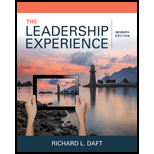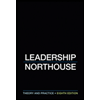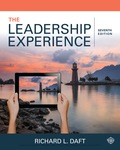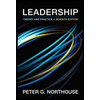
Lms Integrated Mindtap Management, 1 Term (6 Months) Printed Access Card For Daft's The Leadership Experience, 7th
7th Edition
ISBN: 9781337102360
Author: Richard L. Daft
Publisher: Cengage Learning
expand_more
expand_more
format_list_bulleted
Question
error_outline
This textbook solution is under construction.
Students have asked these similar questions
One prominent leadership theory is the situational leadership theory, which suggests that effective leadership is contingent upon the specific circumstances or context in which it occurs. According to this theory, leaders should adapt their style based on the readiness or maturity level of their followers. In other words, leaders must assess the competence and commitment of their followers and adjust their leadership approach accordingly, whether it be directing, coaching, supporting, or delegating tasks. By flexibly adapting their leadership style to meet the needs of their followers, leaders can maximize their effectiveness and facilitate the achievement of organizational goals.
Question: How can leaders effectively assess the readiness or maturity level of their followers in order to determine the most appropriate leadership style to employ?
The basic leadership styles are autocratic, democratic, and free-rein leadership. The best leadership style depends on three elements: the leader, the followers, and the situation.’ Discuss how these elements determine the effectiveness of a leadership style and provide examples
Leadership is a multifaceted concept that encompasses various skills and attributes essential for guiding individuals or groups towards a common goal. Effective leadership involves inspiring and motivating others, setting a clear vision, and providing direction and support to achieve objectives. Furthermore, strong leadership requires excellent communication skills, empathy, and the ability to make tough decisions under pressure. It also involves fostering a culture of trust, accountability, and collaboration within the team or organization. Additionally, effective leaders lead by example, demonstrating integrity, resilience, and adaptability in the face of challenges. By empowering and developing their team members, leaders can cultivate a sense of ownership and commitment, driving performance and fostering innovation.
Question: What are some key strategies that leaders can employ to cultivate a positive and inclusive work environment that encourages creativity, collaboration, and…
Knowledge Booster
Similar questions
- Effective leadership is that which goes well with a given situation.. list the obstacles that are involved in Effective leadership .arrow_forwardIt has been found that when leaders are under stress so that fear and risk increase, they tend to revert to an authoritarian, command-and-control style. As a leader, how might you find the courage to resist this tendency?arrow_forwardLeadership traits are one of the major aspect of leadership theories and practices. What combinations or patterns of traits are likely to be most predictive of leadership outcomes at different levels of an organization (low, middle, and upper)?arrow_forward
- Is laissez-faire leadership equivalent to essentially noleadership at all? Why or why not?arrow_forwardThere are five primary types of leadership: Transformational, Authoritarian, Delegative, Transactional, and Participative. In your initial post: Explain your leadership style. Which of the five primary types of leadership most closely aligns with your style? Why did you pick that style? Why is it the best leadership style for the sector of the economy you choose to work in? (This can either be with your current job or the job you plan to work in after you graduate.) Should leaders change their leadership style to adapt to different circumstances? Why or why not?arrow_forwardThere has been a movement away from the extremes of all-powerful leaders and powerless, submissive followers. Shared leadership, and participatory leadership are emerging as concepts that soften the rigid demarcation lines often found between leaders and followers. A dynamic model of followership that balances and supports dynamic leadership is needed. We need a model that helps us embrace rather the reject the identity of a follower because the model speaks to our courage, power, integrity, responsibility, and sense of service. Discuss your current thinking and understanding of the concept of follower/following/followership.arrow_forward
- Approaches to leadership vary widely, reflecting the diverse philosophies and theories that have emerged over time. One prevalent perspective is the trait approach, which posits that effective leaders possess certain inherent qualities such as confidence, integrity, and intelligence. Another school of thought, the behavioral approach, focuses on observable actions and suggests that successful leadership is a result of specific behaviors rather than inherent traits. Situational leadership, on the other hand, emphasizes the adaptability of leaders to different circumstances, arguing that the most effective leaders tailor their approach to the needs of the situation and their team. Furthermore, the transformational leadership approach emphasizes inspiring and motivating followers to achieve their full potential, while the transactional leadership model focuses on the exchange of rewards and punishments to achieve desired outcomes. These diverse approaches highlight the complexity of…arrow_forwardhow can leaders form these critical decision-making skillsbefore a crisis or disaster happens?arrow_forwardWhat are some common mistakes leaders make when using different leadership styles, and how can they avoid them?arrow_forward
- Directive leadership can be an effective leadership style. true or falsearrow_forwardLEADERSHIP STYLES Make a summary of the topic discussed in the article Explain each leadership style and give examples. For each leadership style, mention what are the strengths and what are the weaknesses, according to the author.arrow_forwardWhy is leadership development essential in our current society? How do communities benefit from leaders who know themselves well and are able to impact positive change? Why is it important for leaders to be flexible and able to respond appropriately to situations? Why do leaders need the foresight and imagination to envision possibilities?arrow_forward
arrow_back_ios
SEE MORE QUESTIONS
arrow_forward_ios
Recommended textbooks for you
 Leadership: Theory and PracticeLeadershipISBN:9781506362311Author:Peter G. NorthousePublisher:SAGE Publications, Inc
Leadership: Theory and PracticeLeadershipISBN:9781506362311Author:Peter G. NorthousePublisher:SAGE Publications, Inc
 Leadership: Theory and Practice, 7th EditionLeadershipISBN:9781483317533Author:Peter G. NorthousePublisher:SAGE Publications, Inc
Leadership: Theory and Practice, 7th EditionLeadershipISBN:9781483317533Author:Peter G. NorthousePublisher:SAGE Publications, Inc

Leadership: Theory and Practice
Leadership
ISBN:9781506362311
Author:Peter G. Northouse
Publisher:SAGE Publications, Inc


Leadership: Theory and Practice, 7th Edition
Leadership
ISBN:9781483317533
Author:Peter G. Northouse
Publisher:SAGE Publications, Inc